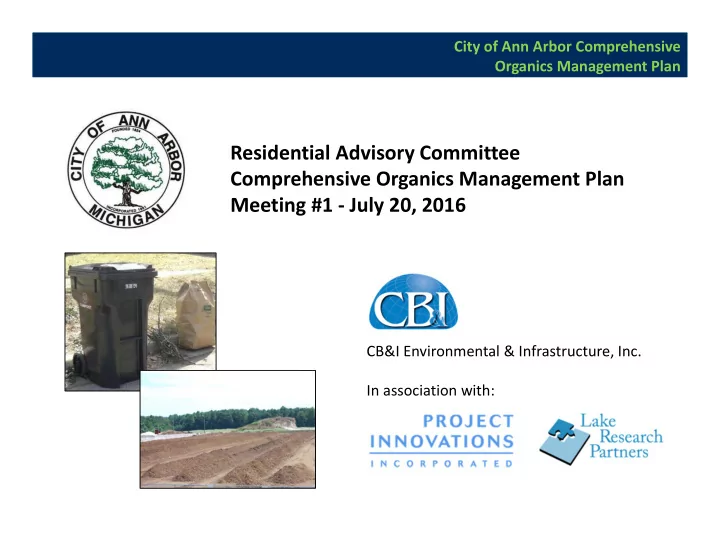

City of Ann Arbor Comprehensive Organics Management Plan Residential Advisory Committee Comprehensive Organics Management Plan Meeting #1 ‐ July 20, 2016 CB&I Environmental & Infrastructure, Inc. In association with:
City of Ann Arbor Comprehensive Organics Management Plan 1. What is Organics Management? 2. City of Ann Arbor Organics Management Background / History 3. Project Overview and Implementation 1
City of Ann Arbor Comprehensive Materials Included in “Organics” Organics Management Plan “Organic”: of, relating to, or derived from living matter Particular materials of focus for the Organics Management Plan: – Yard wastes • Grass clippings • Tree and bush trimmings – Wood • Tree limbs and stumps • Non ‐ treated lumber – Food scraps • Food production wastes • Food preparation wastes • Spoiled/expired food • Plate scrapings – Fats, oils, and grease (“FOG”) from cooking 2
City of Ann Arbor Comprehensive Sources of Organic Wastes Organics Management Plan At home: Away from home: Yard maintenance / landscaping Property maintenance / landscaping Food preparation Food preparation Spoiled or expired food Spoiled or expired food Plate scrapings Plate scrapings Food production and distribution Primary generators of food wastes: Schools Residential properties Institutions Restaurants Food banks / pantries Grocery stores Hospitals 3
City of Ann Arbor Comprehensive Steps in Organics Management Organics Management Plan Segregation Processing Marketing / sale of Collection finished products 4
City of Ann Arbor Comprehensive U.S. EPA Food Recovery Hierarchy Organics Management Plan 5
City of Ann Arbor Comprehensive Organics Management Plan 1. What is Organics Management? 2. City of Ann Arbor Organics Management Background / History 3. Project Overview and Implementation 6
City of Ann Arbor Comprehensive Ann Arbor Organics Program Timeline Organics Management Plan 1995 Landscape waste ban implemented in 2009 2011 Michigan Residential vegetative WeCare Organics food waste added to begins operating compost collection compost facility 2008 2010 2014 Compost carts offered Leaf collection added Residential plate for sale for automated to seasonal compost scrapings added to collection collection (no more compost collection street collection) 7
City of Ann Arbor Comprehensive Current Operations Organics Management Plan Customers served – Single family and multi ‐ family properties Collection provided by City of Ann Arbor – Seasonal (April through November) – 30 ‐ gallon kraft paper bags – City ‐ provided compost carts – Bundled branches / brush Materials collected – Plate scrapings* – Bamboo dinnerware* – Grass clippings* – Weeds – Leaves – Tree branches (up to 6” diameter and 4 feet in length) – Garden prunings / surplus – Pumpkins – Unpainted, untreated lumber – Christmas trees (cut up) – Brush 8
City of Ann Arbor Comprehensive Organics Program Performance Organics Management Plan 9,000 Ann Arbor Residential Organics 8,000 7,000 6,000 5,000 (tons) 4,000 3,000 2,000 1,000 0 2011 2012 2013 2014 2015 Organic materials are a significant fraction of the residential waste stream (20 ‐ 30% or more, by weight) City / WeCare estimate 1,000 ‐ 1,500 tons of food wastes are collected now from Ann Arbor residents Compost is sold by WeCare to wholesale outlets and residents 9
City of Ann Arbor Comprehensive Organics Management Plan 1. What is Organics Management? 2. City of Ann Arbor Organics Management Background / History 3. Project Overview and Implementation 10
City of Ann Arbor Comprehensive Approach to the Plan Organics Management Plan Document review ‐ historical context Community engagement ‐ stakeholders and public input – Interviews – Advisory Committees (Residential and Commercial) – Random telephone survey of residents Opportunities analysis ‐ how much material is available? Logistics and resource needs ‐ how can we collect and process it? Implementation strategy / recommendations Presentation of findings to Environmental Commission and City Council 11
City of Ann Arbor Comprehensive Plan Development Schedule Organics Management Plan Started work in April 2016 Advisory Committees will meet every other month – Residential: July, September, November, January (2017) – Commercial: August, October, December, January (2017) Resident survey ‐ projected to be executed in September Research and analysis underway now Projected presentations: – Environmental Commission ‐ February/March 2017 – City Council ‐ April 2017 12
City of Ann Arbor Comprehensive Challenges to Consider in Planning Process Organics Management Plan Space and logistics Behaviors and attitudes Property ownership Mixed use properties / areas Education and communication Enforcement Sanitation 13
City of Ann Arbor Comprehensive Organics Management Plan For a copy of this presentation and other project updates, visit the project site: www.a2gov.org/organicsplan 14
Recommend
More recommend